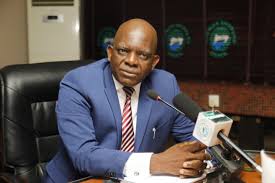Rilwan Bello (Vice President, NAMTOP)
 We all know corruption is a serious problem we have in our logistics space, which is evident in other African countries, but properly managed by their government. How do we explain to investors in Nigeria that before a truck gets to the port, he needs to spend N20,000 to non-state actors. How can the first contact point for international trade which is the port be surrounded by sharp practices. We will continually advocate for a stress-free logistics community in Nigeria.
We all know corruption is a serious problem we have in our logistics space, which is evident in other African countries, but properly managed by their government. How do we explain to investors in Nigeria that before a truck gets to the port, he needs to spend N20,000 to non-state actors. How can the first contact point for international trade which is the port be surrounded by sharp practices. We will continually advocate for a stress-free logistics community in Nigeria.
Frank Obiekezie (National Secretary, AREFFN)
 I was not surprised at the poor performance of Nigeria. It will not be only in the logistics sphere, but by every index. Nigeria is in regression. In the logistics sector specifically, the ease of doing business is not yet where it ought to be, principally because the infrastructure that could go a long way in curbing corruption are not in place. Logistics/ supply chain will be efficient when policies are deliberately created and effectively implemented to achieve targeted objectives. But, there has been some glimmer of hope, following the recent improvements in accessing the ports. We hope there could be further improvements and consolidation on this breakthrough.
I was not surprised at the poor performance of Nigeria. It will not be only in the logistics sphere, but by every index. Nigeria is in regression. In the logistics sector specifically, the ease of doing business is not yet where it ought to be, principally because the infrastructure that could go a long way in curbing corruption are not in place. Logistics/ supply chain will be efficient when policies are deliberately created and effectively implemented to achieve targeted objectives. But, there has been some glimmer of hope, following the recent improvements in accessing the ports. We hope there could be further improvements and consolidation on this breakthrough.
However, a seamless operation of the Eto system has remained problematic, principally due to human factors. In saner climes, such World Bank reports should be a spring board for necessary policy reforms and effective actions, aimed at speedily moving away from such poor categorization, which are capable of sending out negative signals to prospective foreign investors in Nigeria. But, I can bet you that in the next report, Nigeria will still be in the same or even a worse position than where it is now. It is unfortunate.
Mr. Kunle Ajayi (Truck Owner)
 You and I know that we are not in the first five in Africa. I was in Benin Republic for two weeks and I was so surprised they are well organized. If you asked me, we are not where we are meant to be. Generally, in transportation space, our economy is so low. I don’t want to say bad. The transport business is going to flourish if the economy is booming.
You and I know that we are not in the first five in Africa. I was in Benin Republic for two weeks and I was so surprised they are well organized. If you asked me, we are not where we are meant to be. Generally, in transportation space, our economy is so low. I don’t want to say bad. The transport business is going to flourish if the economy is booming.
Sir John Oforbike (ANLCA Chieftain)
 Every nation is beating Nigeria in everything, look at even Benin Republic. It’s a shame for the political class. I don’t have much to say other than to say it’s a pity. Nigeria; the giant of Africa is relegated in all areas of life. It’s very unfortunate, it’s only in corruption we always come first, No other country has ever beaten us in corruption and corrupt practices. Nigeria is sick and we don’t know who can cure her.
Every nation is beating Nigeria in everything, look at even Benin Republic. It’s a shame for the political class. I don’t have much to say other than to say it’s a pity. Nigeria; the giant of Africa is relegated in all areas of life. It’s very unfortunate, it’s only in corruption we always come first, No other country has ever beaten us in corruption and corrupt practices. Nigeria is sick and we don’t know who can cure her.
Bala Muhammed (General Secretary, AMATO)
 I’m not surprised to see the position of Nigeria in the lower rung of the Logistics Performance ladder, due to unfriendly business environment, unethical practices, lack of supportive logistics infrastructure and regulatory framework for progress and stability of logistics business in Nigeria. Our import and export logistics dimensions are marred with multiple taxations and extortions that are affecting the ability of logistics business operators to deliver. Government should come up with a regulatory framework that would promote and protect the interests of logistics service providers to elevate the position of Nigeria in the logistics performance index ranking.
I’m not surprised to see the position of Nigeria in the lower rung of the Logistics Performance ladder, due to unfriendly business environment, unethical practices, lack of supportive logistics infrastructure and regulatory framework for progress and stability of logistics business in Nigeria. Our import and export logistics dimensions are marred with multiple taxations and extortions that are affecting the ability of logistics business operators to deliver. Government should come up with a regulatory framework that would promote and protect the interests of logistics service providers to elevate the position of Nigeria in the logistics performance index ranking.
Pius Ujubonu (ANLCA Chieftain)
 The indices of measurements of Nigeria’s performance in several aspects of our national life have been on descent since 2015. It would not in any way come as a surprise when we narrow it down to the logistics performance index. By the way, who are the drivers of trade, transport and related industries? What infrastructures do we have on ground to stimulate logistics; intra and international. Who are the planners? What strategy do we have, unfortunately, we have experts in this field of endeavour, but they are seldom positively and effectively engaged in planning and execution. Reasons being that the drivers and managers are very transactional in their approaches, for this they prefer to wait and get contractors who lack commitment and patience for actionable strategic plan and development. It is not only a pity, but deplorable.
The indices of measurements of Nigeria’s performance in several aspects of our national life have been on descent since 2015. It would not in any way come as a surprise when we narrow it down to the logistics performance index. By the way, who are the drivers of trade, transport and related industries? What infrastructures do we have on ground to stimulate logistics; intra and international. Who are the planners? What strategy do we have, unfortunately, we have experts in this field of endeavour, but they are seldom positively and effectively engaged in planning and execution. Reasons being that the drivers and managers are very transactional in their approaches, for this they prefer to wait and get contractors who lack commitment and patience for actionable strategic plan and development. It is not only a pity, but deplorable.
Francis Omotosho (Registrar, NAGAFF Academy)
 The major challenge shippers have in Nigeria is the logistics system expenses in their delivery supply chain. Shippers can easily negotiate their invoice cost with their buyers or sellers, but can not determine the total logistics expenses to incur at all our international trade entry points. As a matter of fact, Nigeria National Logistics Component Costing is the highest in the whole of Africa. No doubt the whole economic meltdown in Nigeria is as a result of the high cost of logistics expenses. I advise the government to seriously look into this as the only way out to solve the lingering high poverty and hunger in Nigeria.
The major challenge shippers have in Nigeria is the logistics system expenses in their delivery supply chain. Shippers can easily negotiate their invoice cost with their buyers or sellers, but can not determine the total logistics expenses to incur at all our international trade entry points. As a matter of fact, Nigeria National Logistics Component Costing is the highest in the whole of Africa. No doubt the whole economic meltdown in Nigeria is as a result of the high cost of logistics expenses. I advise the government to seriously look into this as the only way out to solve the lingering high poverty and hunger in Nigeria.
Babatunde Mukaila (Former National Secretary, ANLCA)

My take on this is that further improvements on the performance parameters are needed. I believe the Nigeria Customs Service has started laying a critical structure for trade facilitations. Also, deeper collaborations to streamline inter-governmental agencies conflicting mandates will help Nigeria rating in the nearest future.















